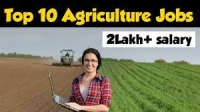Jobseeker
There’s more to a career in agriculture than just being a farmer (although, of course, that is also a very viable career option for those looking to get into the field).
So, if you’re looking to work in agriculture, but don’t know what careers are available to you (and what you need to study to get them) look no further, as we will explore the top careers in agriculture today., and the skills you need to succeed in these roles.
Agricultural engineer
As an agricultural engineer, you will seek to improve current farming methods, designing new equipment and machinery using computer aided technology (CAD). You will also use data from the weather and GPS to advise farmers and businesses on land use, assessing the impact of the current processes on crops and the surrounding environment. In this role you may also get to supervise agricultural construction projects.
For this role you will need to have a strong grasp of mathematics, science, and problem solving, as well as being creative and able to communicate effectively.
Agricultural economist
In your role as an agricultural economist, you will apply microeconomic and macroeconomic concepts and theories to understand economic decisions, such as why shoppers make certain decisions about the food they buy and how the government chooses how to support farmers. You will be analyzing economic data to find and determine trends in economic activity.
Some agricultural economists spend their time in an office, performing calculations and analysis on a range of data. Others spend their time in the fields, surveying land, interviewing farmers and performing research.
Agricultural economists mainly work independently, but may have to collaborate with other economists, farmers and statisticians. An economics degree is preferable for those wanting to become an agricultural economist. A strong grasp of mathematics is vital for this role, and you must be able to analyze and interpret data effectively and present it in a clear and efficient way.
Farm manager
As a farm manager, your role will be to oversee the running of the farm and make business decisions whilst keeping within budget parameters. You will arrange the maintenance and repair of farm buildings and equipment, market the farm’s products and ensure that they are ready in time for markets and auctions. On top of this you will ensure that all processes comply with government regulations and that health and safety standards are applied at all times.
For this role, you will need previous experience in hands on farming, as well as technical knowledge, as the role will require you to work in hands on tasks as well as administrative tasks. Most farm managers also have an agricultural related degree, such as agricultural engineering or agriculture.
Soil and plant scientist
As a soil and plant scientist, you will test the composition of the soil in order to assess how it affects plant growth, researching alternative methods of growing crops (such as genetic modification) in order to maximize efficiency. You will present this data in detailed reports to advise food growers how to use their land most efficiently, informing farmers on the crops which are most suitable.
Many soil and plant scientists spend their days working in offices or laboratories, doing research or outside gathering samples on farms to use in their research. Soil and plant scientists specializing in food may work in kitchens, in order to test new food processing methods.
Conservation planner
Conservation planners are responsible for determining the environmental and ecological value of land, to decide whether it should be preserved or whether it can be built on. If land is deemed too valuable to be built on, conservation planners will draw up a report telling stakeholders what they can and cannot do.
As a conservation planner, your day to day tasks may include preparing reports, developing budgets, identifying and analyzing any environmental issues and promoting environmental management. You will be acting as the middleman between developers, environmental groups and the government.
To be a conservation planner, you will need to have good project management skills, be extremely self-motivated and organized. An environmental science degree would be extremely useful in this role, and you must also have good analytical skills.
Commercial Horticulturalist
As a commercial horticulturalist, you will be involved in monitoring the entire production process – overseeing the growing, harvesting, packaging, distribution and selling of food, crops and plants.
Typical day to day activities might see you supervising and training staff, managing pest/weed control programs, writing business plans, developing new products, marketing products, negotiating contracts with buyers and sellers, and helping to sell the finished products.
Commercial horticulturalists need to be extremely detail-orientated, with strong management and communication skills and have a great deal of commercial awareness.
Agricultural salesperson
Working in agricultural sales, you will sell machinery, animal feed, fertilizers and seed to farmers. You will be expected to be an expert in your product and will often advise farmers on products. You will need to be able to listen to the needs of the farmer, and then recommend the correct products to suit their requirements.
The ability to build long term relationships, as well as being persuasive and knowledgeable on your product are all skills which are vital in this career. Sales and marketing degrees would be extremely valuable if you’re looking to pursue a career in sales.



